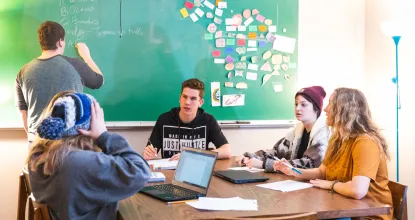The following are considered typical accommodations in a university setting. Please remember that educational goals and objectives differ for post-secondary education under the Americans with Disabilities Act (ADA). Therefore, students may receive accommodations in high school that cannot be provided in a university setting. Unlike high school, in a university setting, the institution is responsible for providing access, not ensuring success.
Assistive Technology
Some examples include alternative text formats, assistive listening devices, and adaptive computer access.
Extended Quiz/Test Time
Uninterrupted testing time that is typically one-and-a-half times (1.5x) the time allotted to take a quiz or test. For example, if a test is 50 minutes, a student receiving 1.5x would have 75 minutes for the testing process.
Alternate Testing Site
A testing site provided by Disability Services with minimal distractions. This is not a completely private testing room; students are still proctored as they would be in the classroom.
Classroom Preferential Seating
Seats can be reserved for students who stay more focused sitting in a certain place during a lecture (e.g. front or back row, away from windows, close to the door).
Advocating with Professors
The Coordinator of Disability Services can explain how to speak with professors about absences due to military orders or medical appointments as well as how to address other circumstances that may arise for students in the classroom.
Classroom Furniture
Padded and flexible back chairs and standing desks can be provided for students who have injuries that make it difficult to sit for long periods of time.
Glean Notetaking Software
Glean is NMU's primary notetaking accommodation, an online notetaking software that allows students to capture everything from class, building useful knowledge without missing any important information.
Some of Glean's key features include the ability to record lectures, insert images, make task lists, mark important areas to come back to, insert slides, transcribe audio, and much more.
Notetaker/LiveScribe Pen
If Glean does not provide effective solutions, an in-person notetaker may be provided. A notetaker is typically a classmate contracted to provide notes to eligible students. The student receiving notes must attend class and be actively engaged in the lecture.
LiveScribe Pens are also available to eligible students. The LiveScribe Pen is an innovative device that can record lectures, monitor your notes while you write, and connect your notes to your laptop/computer. It looks like a pen and notebook.
Alternative Textbooks
The following are the steps for accessing your electronic textbooks/e-books: When purchasing your books from the NMU Bookstore or an online site, please purchase the electronic format, if available. If not available, search the following sites: Chegg.com, Amazon.com, and Bookshare.org. Some sites may require disability documentation. Please contact the NMU Disability Services Office for additional assistance at 906-227-1737 or disability@nmu.edu.
Test Reader
A test proctor will read the test items to the student as often as the student needs within the allotted test period. The proctor will only read the test and may not offer any clarification of the test.
Alternatively, the student may be provided with a Reader Pen, a piece of assistive technology that will read the quiz/test aloud to the student.
Test Scribe
A test proctor writes or types what the student dictates are the answers to the test. The student is still responsible for any corrections to grammar, spelling, and structure. The proctor will only write or type the test may not offer any clarification of the test.
